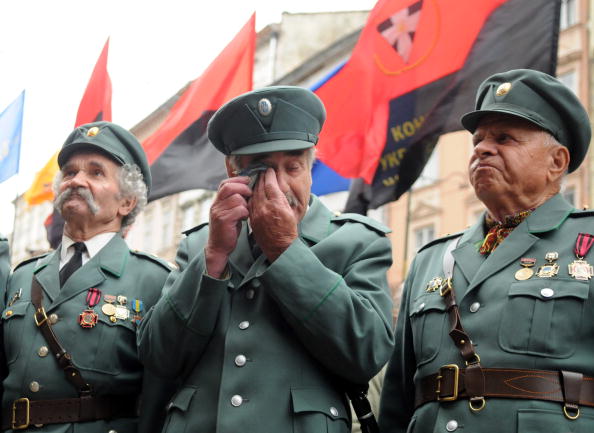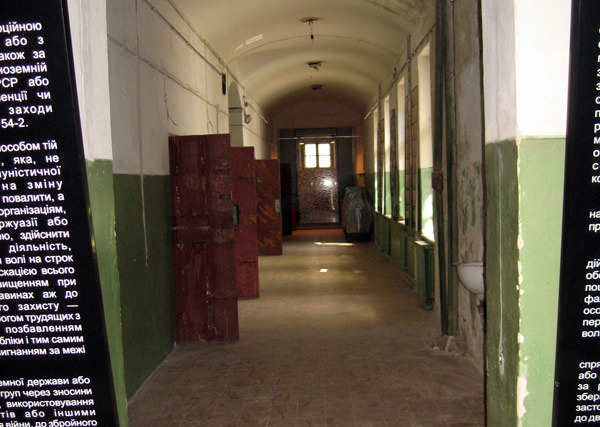On summer evenings, the people of the west Ukrainian city Lviv come to sing: under the statue of Taras Shevchenko, the great poet who prophesied Ukrainian independence in the nineteenth century, on the street that was renamed Liberty Boulevard when Ukraine emerged from Soviet rule in 1991. The songs tell of beautiful dark-eyed girls pining for brave soldiers. In one song, young men must leave their homes to fight for freedom as partisans; in the next, they are overwhelmed and killed by Soviet forces. One of the more bellicose songs ends “We’ll cry out ‘Glory, glory, glory’ until the earth shakes,” accompanied by the stamping of feet on the cobblestones. These passionate Ukrainian laments overlook the fact that Lviv was once Polish Lwów, and before that Habsburg Lemberg. Well into the twentieth century it was a Polish-Jewish city. During World War II the Germans killed the Jews and the Soviets expelled the Poles, leaving the city to be resettled by Ukrainians from the countryside as it was annexed to an expanded Soviet Ukraine. Ukrainian nationalists, some of whom played a part in the elimination of Jews or Poles, fought desperately and courageously against Soviet rule. The songs celebrating them forget the people who used to live in Lviv, and the part the Ukrainian nationalists played in their removal.
This version of Ukrainian history, flawed though it is, was until recently part of a national conversation about the past. Now Ukrainian historians who draw attention to Ukrainian national resistance to Soviet rule find themselves under pressure from the state. On September 8, the Security Service (SB), under new leadership appointed by the Ukrainian president Viktor Yanukovych, arrested in Kiev a young historian named Ruslan Zabilyi, the director of a museum in Lviv devoted to the occupation of Ukraine by the Nazis and the Soviets. He is charged with intending to pass state secrets to foreigners. On September 13 and 14, SB agents searched the offices of the museum’s research staff, confiscating two laptops containing archival documents for a planned exhibition on Ukrainian resistance to Soviet rule; authority over the museum has been transferred to the Institute of National Memory, which is now directed by a communist.
Ukraine is less a country than a concentrated expression of the worst of the European twentieth century, a place where the realization of both Stalinism and National Socialism left behind killing fields of all sorts, multiple terrains of forgetting, full of pitfalls. The last president of Ukraine, Viktor Yushchenko, tried without success to elevate the west Ukrainian myth of suffering and resistance to pan-Ukrainian history, canonizing the nationalist Stepan Bandera as a Hero of Ukraine. His successor Yanukovych represents a part of Ukraine united by another kind of oblivion. Southeastern Ukraine was industrialized after a famine orchestrated by Stalin killed about three million Ukrainians. While Ukrainians in the west tend to forget the Poles and the Jews, inhabitants of the southeast forget the starved Ukrainians whose lands were sometimes taken by their parents or grandparents. In eastern Ukraine, service in the Red Army during World War II is generally considered heroic, and the nationalists who resisted the expansion of Soviet power to western Ukraine are seen as outsiders or criminals. Forgotten are the crimes committed by the Red Army itself.
In independent Ukraine, the SB has been charged with organizing some of the selective remembrance. In an ill-considered move, Yushchenko extended the purview of the SB to include oversight of national memory policy, including control of some museums. Thus the SB took an active part, in the last weeks of Yushchenko’s rule this last winter, in a “trial” that found Stalin and others guilty of genocide during the famine. It also permitted a former Soviet prison in Lviv to become a museum of the occupation of Ukraine by the Nazis and the Soviets. The museum is dedicated to a version of history similar to that of the laments in Lviv: it presented Ukraine as the homeland of Ukrainians, fighting heroically against both Soviet and German occupation. Yanukovych, who has taken a much more forgiving approach to Stalinism than his predecessor, began his presidency by denying that the famine was genocide. The Lviv prison that became a museum is now, ironically, the site of the arrest of a historian. According to the Ukrainian Helsinki Human Rights Union, Zabilyi was seized on the street by six plainclothes SB operatives, held without a warrant or an arrest order, interrogated for fourteen hours, and forced to surrender his computer and external hard drives. Though Ukrainian law is confusing on these issues, the basic case against Zabilyi seems to be that he was intending to transmit documents from archives to foreigners.
Advertisement
That, of course, is what historians do. We read documents in archives, we interpret them, and we communicate our findings. An honest conversation about the past requires discussion informed by documents; in Ukraine, the site of famine, terror, and Holocaust, such discussion is more pressing than elsewhere. Under Yushchenko and his two predecessors, a certain regional pluralism meant that discussion was always taking place. From the differences of opinion between west and east arose, at times, real hope for a common Ukrainian history, in which each side might address some of the oversights of the other. Now Yanukovych is suppressing one variant of history, which can only mean the enforcement of his own orthodoxy.
But even more fundamentally: arresting Ukrainian historians for using Soviet-era documents is a radical change for the worse. It makes the Soviet past, and in particular the history of Stalinist repression of Ukrainians, appear to be a state secret. The SB has muddied the waters by presenting Zabilyi as their own employee, which is true because the SB had authority over the museum, but this is irrelevant. It is possible that he was chosen for the first arrest in a campaign because the SB command is aware that a historian working at a museum that emphasizes west Ukrainian nationalist resistance will seem unappealing to international observers. Thus when the international protests come, Kiev could well respond, in good Soviet style, by presenting Zabilyi as a nationalist reactionary. But the fundamental point transcends the individual. If one historian can be arrested for using documents, then others can be too. If the protest does not come, then others will be arrested. Much of what we have learned about both Stalinist repression and the Holocaust in the past twenty years has come from Ukrainian archives. The intimidation of historians is a threat not just to civic life in Ukraine, but to the advance of our knowledge of the recent past.




